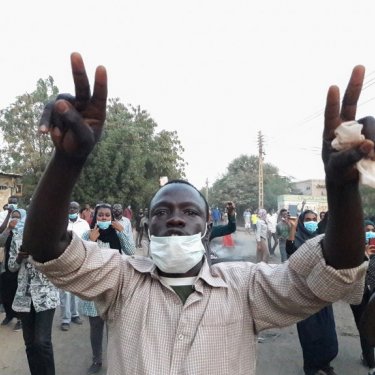At least 79 journalists arrested in two months of protests in Sudan

The number of journalists arrested in the course of a nearly two-month-old wave of anti-government protests in Sudan is at least 79, Reporters Without Borders (RSF) revealed at a press conference in Paris yesterday.
RSF has so far registered a total of 79 media personnel arrests since the protests against an increase in the price of bread began on 19 December and then quickly grew into angry demonstrations against the regime.
These systematic arrests have targeted not only reporters covering protests in almost all parts of the country but also journalists who themselves dared to protest against the regime’s policy of censorship and arrests of journalists with the aim of restricting coverage of the protests.
RSF denounced the regime’s targeting of journalists in a press release on 15 January, in which it reported that 28 journalists had been arrested the previous day while staging a protest against the repeated press freedom violations.
A total of 16 journalists were being held at the height of the crackdown at the start of February. All had been detained for more than 48 hours and some for several weeks. They have all been freed in the past few days after President Omar al-Bashir met with a number of newspaper editors on 6 February.
“The release of detained journalists is far from ending the crackdown on the media,” said Arnaud Froger, the head of RSF’s Africa desk. “We call for an end to all forms of censorship, including an end to the repeated seizures of newspaper issues and the dropping of all judicial proceedings against media personnel. There will be no resolution of the crisis in Sudan if journalists are not free to cover what is happening.”
Print media throttled by censorship
The all-powerful National Intelligence and Security Service (NISS) continues to ban and seize newspaper issues. RSF has registered a total of 63 bans and seizures since 19 December. Al-Jareeda, one of the most-targeted newspapers, has managed to publish an average of less than one issue every two days since the start of the crackdown. This extreme censorship has already cost the Sudanese print media tens of thousands of euros.
Several journalists, including Al-Tayaar editor Osman Mirghani, Al-Tayaar reporter Shamael Al-Noor and freelancer Durra Gambo, are being prosecuted for their coverage of the protests. Yousra Elbagir, a reporter for foreign media outlets such as CNN, the BBC and Channel 4, says she has left Sudan after being threatened with charges carrying a possible death penalty.
Neither the National Council for Press and Publications (NCPP), which regulates the Sudanese media, nor information minister Bushara Guma Aror responded to RSF’s phone calls and messages.
Sudan is ranked 174th out of 180 countries in RSF’s 2018 World Press Freedom Index.



